#the uncut revolutionary
Explore tagged Tumblr posts
Note
So I've asked you this in private, but I thought the rest of your followers should see this as your thoughts are quite entertaining.
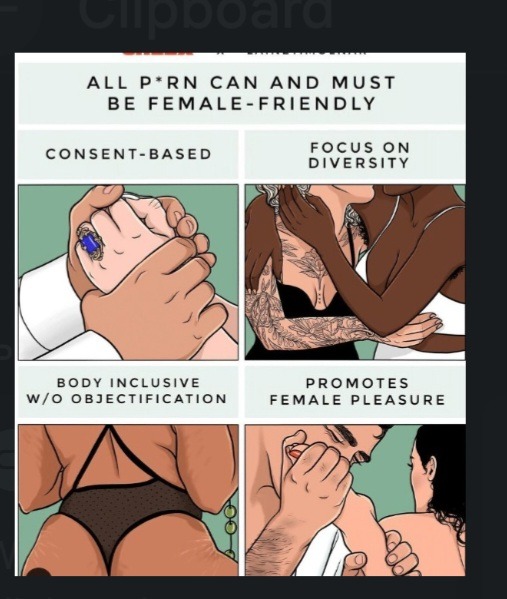
What is your opinion on the idea of stuff like this being the only acceptable method of pornography?
*cracks knuckles* Let's get the easiest part out of the way first.
Saying Something Is "Female-Friendly" Is Just Marketing
I'm sorry (not really) to be the one to state the obvious, but at best labeling any kind of pornography as "female friendly" means "most of the people that enjoy this are women" - which is very different from saying "ALL women are into this" or "No guys are ever into this." It's the good old "this cartoon is for boys, that one is for girls."
It's not a radical statement, it's not revolutionary, and it is at best a morally neutral mention of a random statistic that is being used to find the best demography to advertise to and at worst just pointlessly trying to force people into boxes with that they are/are not allowed to enjoy based on their gender.
Don't believe me? Well, too bad because this image you're seeing is literally part of a facebook ad for a porn site. The name of the site and of the artist they were working with can be seen at the top in the uncut version. Like I said, it doesn't matter how "radical" these claims of "this product is made for/by X minority group" pretend to be, at the end of the day it's just marketing.
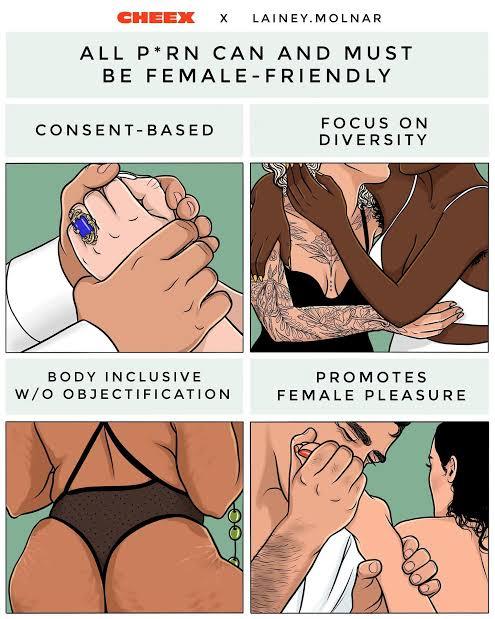
"Oh, but people obviously support the message it's sending anyway!" True... but that message is at best filled with poor word choices, and full on terrible at worst.
Consent - Important In Real Life, Meaningless In Fantasy
In the context of this being an ad for a porno site, I think it's safe to say "Consent-based" is just a way of assuring viewers that every actress was fully consenting to every sexual act and was not pressured into anything in any way, which is the bare minimum.
HOWEVER, I've seen plenty of people misunderstand or flat out lie about the "consent-based porn" term means. Like I explained, it is meant to be about the ACTORS consenting - but their "characters" don't need to consent to anything because they are not real. A hardcore CNC fantasy with the actress pretending she doesn't want the sex/is not enjoying it while her co-star pretends to force themselves on her is STILL consent-based if the actress playing the victim role can stop the scene for literally any reason and even walk out completely if that's what she wants.
Unfortunatelly, because kink-shaming is still very much a thing, people act like that is crossing a line and totally counts as legitimate assault - even in videos that the actors before AND after the scene mention how excited they are, how great it was, openly discuss their kinks, etc.
Nobody needs to watch something so extreme if they don't want to, but I have a serious problem with people saying stuff like that shouldn't ever happen. If the people involved in the role-play are doing it WILLINGLY and can back down at any moment, then it isn't in anyway immoral.
Sexual Attraction Is NOT The Same As Respect/Acceptance
Once again, I'm sorry (not really) to be the one who has to tell you guys this, but "representation" in porn is meaningless because:
1 - It doesn't matter how many porn videos there are of any minority group - each individual person picking something to watch will only click on the ones that show people with the body-types and genders they are attracted to, doing stuff they personally find appealing.
2 - "This kind of porn is popular" does not in anyway translate to "this is what society deems morally acceptable". A ton of homophobes LOVE lesbian porn. My country, Brazil, has always had porn with trans people and crossdressers as one of THE most popular trends - yet we are also the country that commits hate crimes against them the most, even when compared to places where being trans or crossdressing is literally a crime that earns you an authomatic death sentence. Incest porn has been obscenely popular everywhere for decades yet most people STILL find the thought of real-life incest absoutely repulsive.
3 - "I am not usually/ever attracted to people of group X" doesn't authomatically mean "I HATE people of group X." Just cause I like red-heads and brunettes, doesn't mean I'll be commiting hate crimes against blondes. If that was how things worked, sex-repulsed asexuals would hate literally all of humanity.
Wanting porn to be inclusive is utterly pointless because sexual attraction is 100% morally neutral. Which brings us to...
What Even Counts As "Objectification"?
Once again, if by "Don't objectify people" we are talking about how "Just because you hired this person to star in a porno, it doesn't mean you can just ignore their consent, comfort and safety for the sake of your fetish" then yeah, that's the bare minimum.
However, if you're saying "don't objectify people" as a way to say "Don't make the video too graphic/obscene/kinky" then we absolutely have a problem here because, my guy, it's porn. It is all about letting us see hot people looking slutty and fucking in great, explict detail.
"Oh, but these sexual acts are humiliating and gross!" To you, maybe. But not to the actors that are very willing to do it. I've had some of my fetishes be called both deeply disturbing and gross AND the most vanilla shit ever. That kind of stuff is 100% subjective, and the only people who can say "I felt disrespected/unsafe/abused" are the actors themselves. Once again, if THEY consented, there's nothing wrong with it regardless of it appealing to you or not.
"Oh, but we'd be wasting an opportunity to educate people/give X group more representation"
If I ever click on a porno and there's a two minute intro with the actors, both belonging to some minority group, talking about how one of them is also historian and the other is a astronomer, I will STILL only care about seeing them fuck even though I love both history and astronomy - not because I don't think they can't possibly know what they're talking about since they are sex workers or because of some kind of bigotry, but because, surprise surprise, I only check out porn sites for the porn. That's what EVERYONE does.
Hell, bad porn can be used to educate people. 50 Shades is awful and a ton of ignorant people think it is 100% accurate to how BDSM actually works. However, this has led to entire groups of people who are actually kinky to discuss REAL BDSM with vanilla people and educate them on how it can be a great thing. And, of course, there's people that enjoy those shitty novels/movies but KNOW they are not accurate representiation of BDSM because they are aware that PORN IS JUST FANTASY, NOT A GUIDE TO HOW SEX SHOULD WORK!
"But it's so shallow to focus only on these people's looks and know literally nothing else about them!"
Yes, and? Being "shallow" isn't always bad, and feeling attracted to someone solely for their looks is not a crime.
Don't get me wrong, I'm a goddamn fanfic writer and I was once the classic "teenager that totally thinks she'd have a chance with that famous rockstar that is old enough to be her dad", I KNOW that the thought of a real connection (emotional, intelectual, etc) CAN be hot - but there's nothing wrong with "These two people whose names I don't even know look hot, I wanna see them fuck, then I'll go take a nap and never think of them again." These porn stars are not crying themselves to sleep because people whose faces they've never even seen don't know anything about them other than how they look without clothes on.
"Female" Pleasure - Yet ANOTHER Hollow Marketing Term!
Seriously, that last one REALLY irritated me because it's one of those things that tries to sound progressive, but are meaningless at best and downright sexist at worst, because it implies:
1 - There must be a strict separation between "female" pleasure and "male" pleasure. A sexual act cannot possibly be enjoyable for both the guy and the girl, and gender prevents men and women from EVER being into the same thing (as a woman that finds more porn that fits my taste in "male-centered" sites than in most "porn for women" sites, this one gets on my nerves).
2 - Pleasuring one's partner cannot possibly be enjoyable - so, say, a girl cannot possibly enjoying giving her boyfriend head, and vice versa.
3 - Sex is a competition and women NEED to win because "female" pleasure is apparently more moral than "male" pleasure (hence the "ALL porn can and should be 'female' friendly")
4 - ALL women are turned on/turned off by the exact same sexual acts, and the level of pleasure they get is always exactly the same. Preferences are not individual and never change over time. (Seriously, a woman directs a sex scene between two actresses, the editor is a woman, and all the viewers are women - which one will speak for her entire gender and decide what "female" pleasure looks like? You see how silly this sounds?)
Conclusion
Sex and sexuality can never be over-simplified like that, and fantasies are just harmless fun.
177 notes
·
View notes
Text
KATHLEEN HANNA ANNOUNCES MEMOIR, REBEL GIRL: MY LIFE AS A FEMINIST PUNK

7/13/23: Kathleen Hanna has announced that she’s releasing a memoir in May of next year: Rebel Girl: My Life as a Feminist Punk is out Tuesday, May 14, 2024, via Ecco (a HarperCollins imprint). The book will follow Hanna’s story from childhood to her college years in Olympia, Washington.
Kathleen Hanna's rallying cry to feminists echoed far and wide through the punk scene of the 90s and beyond. Her band, Bikini Kill, embodies this iconic time, and today her personal yet feminist lyrics on anthems like "Rebel Girl" and "Double Dare Ya" are more powerful than ever. But where did this transformative voice come from? In Rebel Girl, Hanna's raw and insightful new memoir, she takes us from her tumultuous childhood home to her formative college years in Olympia, Washington, and on to her first years on tour, fighting hard for gigs and for her band. As Hanna makes clear, being in a "girl band," especially a punk girl band, in those years was not a simple or safe prospect. Male violence and antagonism threatened at every turn, and surviving as a singer who was a lightening rod for controversy took limitless amounts of determination. But the relationships she developed during those years buoyed her--including with her bandmates, Tobi Vail, Kathi Wilcox, and Johanna Fateman; her friendships with Kurt Cobain and Ian MacKaye; and her introduction to Joan Jett-- were all a testament to how the punk world could nurture and care for its own. Hanna opens up about falling in love with Ad-Rock of the Beastie Boys and her debilitating battle with Lyme disease, and she brings us behind the scenes of her musical growth in her bands, Le Tigre and The Julie Ruin. She also writes candidly about the Riot Grrrl movement, documenting with love its grassroots origins but critiquing its later exclusivity. In an uncut voice all her own, Hanna reveals the hardest times along with the most joyful--and how it continues to fuel her revolutionary art and music.
you can pre-order Rebel Girl now though bookshop.org!
147 notes
·
View notes
Text
Pikmin-ifiable enemy adjectives stolen from Bots
Will continue updating via reblogs/edits going forward forward. Feel free to use if inspired!
Burgeoning
Difficult
Uncut (? May it could be a worm enemy that splits in two or something)
Palletable (Had a thought for this one while rewatching chuggaconroy's Pikmin 3 lets play: Like, A Pineapple that gained sentience or smth. When defeated, its body is a collectible b/c its a sentient fruit)
Overhanging
Frat (Not an adjective, but I feel like it could be funny to have a "Rat king" kind of monster be called a 'Conjoined Frattlewhump' or something, lol)
Slick
Adament
Conservative
Offbeat
Leaking
Bankrupt (Something like a Breadbug that can't collect things, maybe? So it just keeps dragging things around until it's taken care of)
Blasted/Blasting (Same as uncut- Could be an enemy with two forms. Like, imagine an enemy that violently explodes as an attack, which then leaves it vulnerable!)
Revolutionary
Fragmented
Incremental
Second
Gouging (Mm, the immediate is p violent... Maybe its talking about fruit or smth?)
Robust
Coastal
8 notes
·
View notes
Text
Best Attic Insulation

If your attic insulation isn’t layered appropriately, it can drastically cut back the insulation’s effectiveness, thus, raising your power invoice. The reply is simple; make the most of a professional attic insulation specialist or an area contracting firm to properly set up your attic insulation. Experienced contractors will make certain that every weak point is covered with the correct insulation or spray foam. You achieve entry to a team of experienced engineers who can present advice, technical support, and revolutionary, custom-made options. Though a generally missed factor, this is essential when choosing essentially the most applicable resolution for your project - insulation installers brisbane.
Insulation machinery is vital for the appliance of insulation like spray foam and blow-in. Unlike most common insulation techniques, which resist conductive and convective heat circulation, radiant limitations and reflective insulation work by reflecting radiant warmth. The primary distinction between insulation batts and rolls is that batts are put in in items, while rolls are rolled out between wall and ceiling framing. Insulation rolls go away less alternative for gaps between sections, making them generally more effective than batts. Low-density, open-cell polyurethane foams use air as the blowing agent and have an R-value that doesn’t change over time. These foams are just like typical polyurethane foams however are more versatile - ceiling insulation brisbane.
The insulation leaves the hose with sufficient pressure that it can be directed to many areas of the attic, very much like water from a hose. These kinds of attic insulation can be dangerous involved with the skin, particularly rock wool/mineral wool. You should not expose yourself to spray foam if you install insulation, as it can simply irritate your pores and skin. Spray foam is an expensive type of insulation that will require greater costs, at least for a brief time. If left uncut, they will be unable to entice heat nicely, which will reduce the r- value of your setup. You can probably install it yourself without needing the assistance of a contractor. Fiberglass presents no health hazard to your home as the material is non- combustible. For more information, please visit our site https://roofsuckers.com.au/.
0 notes
Text

fuckimg pinned hi. call me T, she/rot/it
schizo, npd, paraphile, cripple, aroaceaplafam, radqueers fuck off
i dont have a dni or byf this is a free zone
TW's for my blog: eyestrain+glitchy aesthetics, g-re, sn-ff, violence, trauma+abuse, sui+sh, unreality, uncut orgasmic tragedies, the loser otaku girl that sits at the back of your classroom and stinks to high hell, mental illness rants (see above).

tags
s3r.exe - textposts
vent, tw vent - vent textposts
s3r.png - any image thats made by me in some way







,,--,-,p,-, :3
anime i've seen / watchlist. ✅= watched; ❌ = haven't seen, 🔄 = need to rewatch, 👁️ = in progress. this doesnt include everything ive seen, if its on here but says watched then its some fucking godnasty cringe shit
i love media thats fucking awful. rec me your worst moeshit cringecore lana del ray anime that only people who dont shower actually like
Lucky Star👁️
Ouran Highschool Host Club🔄
Watamote🔄
Vampire Knight🔄
Shimoneta🔄
No Game, No Life!🔄
The Devil is a Part-Timer!🔄
Revolutionary Girl Utena❌
Love, Chunibyo, & Other Delusions!❌
Angel Beats!❌
Another❌
Re:Zero❌
Akame ga Kill❌
Chobits!❌
Blend S❌
Bocchi the Rock!❌
Charlotte❌
Highschool DxD❌
Interspecies Reviwers❌
My Mental Choices Are Completely Interfering with my School Romantic Comedy❌
0 notes
Text
Designer Polki Jewellery | Jadaav Jewels
Designer Polki jewellery is the height of luxury, merging traditional craftsmanship with revolutionary concepts. These products, which frequently have uncut diamonds set in gold, are admired for their delicate ornamentation and outstanding craftsmanship. Designer Polki jewellery is excellent for weddings and serious parties, with a timeless, regal style that summarizes the essence of culture and elegance.

0 notes
Text
When your only exposure to Luddism is Marx, you end up saying dumb shit like this.
Luddism was a labor movement which very much understood that the problem isn't technology, it's how you use it. Marx is just flatly wrong here because it serves his narrative to parrot the British propaganda about the Luddites, and it's part of a recurring failure of his to understand that self organizing workers can have coherent and meaningful understanding of their oppression and work against it with strikes and protests. Rather than, you know, the only meaningful resistance being through coffee shop intellectuals organizing workers on their behalf through high concept political systems, working towards a sudden instant of mass resistance.
The Luddites fully fucking understood that the problem wasn't the mechanical looms taking their jobs, that it was factory owners making the conscious decision to pay their workers less now that they had the leverage of a mechanical system which reduced the skill required to labor. They also had a moral opposition to how the factory owners were intentionally designing their factories to be operable by children. And they didn't destroy the machinery because they couldn't distinguish between the machinery around its employment by capital, because again they weren't stupid.
Marx has a habit of treating workers as simultaneously the stupidest people on earth and also a gold mine of unliberated potential intellect, but whether he thinks they're stupid or brilliant uncut gems in the moment tends to depend on whether or not he agrees with their politics. In this case he didn't. See the Luddites destroyed the machinery because it was expensive and accessible. This meant they could destroy it at extreme cost the factory owners. Hitting the only thing the factory owners cared about, their profits. Their goal was to use that damage to force a negotiation with the owners for pensions for workers who would be losing their jobs because of the new technology, for the new factories to not employ any children, for reasonable hours for the workers who would stay on, for appropriate profit sharing for those workers, etc. They lost because Britain responded by with all of the force of the state and mass hung people by the hundreds who were even tangentially associated with the movement or in the wrong place at the wrong time. But their goal was to maintain basic standard of living and morality and they were willing to destroy the capital of the owning class to do so.
The problem is that Marx believed that any labor movements which improved the quality of life of the working class were counterproductive. See he believed the only meaningful reform could be through mass political upheaval and be complete abolition of capitalism, and that anything which improved worker quality of life would reduce the people's drive to rebel in such a convulsive way. Now if you know little anything about labor organizing, you'll know this is fucking stupid! Quality of life wins build trust among workers. They build solidarity. They make people realize that they can win. They build the on the ground organizing networks which actually leads to larger wins and enable those convulsive uprisings (if that's what you're aiming for), which contrary to Marx's theories actually very rarely come from a general population sentiment of being so goddamn miserable that death is preferable.
But Marx? His problem with the Luddites was that they didn't either try overthrow capitalism entirely, or if that wasn't doable (and the British response suggests it wasn't) willingly let themselves lose their jobs and send their children to the factories for the greater good of making themselves more miserable to increase revolutionary pressure in Britain. That's what he was chastising them for. That's what he thought they should do rather than destroying the extremely expensive machinery to inflict economic losses on an owning class which was inflicting suffering on them, to achieve bargaining parity.
This was actually the major failure of the Marxists in Russia when it came to getting actual workers on their side, which they failed remarkably at over and over and over. The actively worked against strikes for better working hours and pay, thinking it would reduce the rebellious boil to a simmer, not realizing that all the other socialists who were happy to organize with the workers in that way were building trust and faith that through organization they could create change. It's part of why the Bolsheviks (eventually rebranded as Communists) lost the democratic elections to the various Socialist parties, losing the vote not only among the peasant workers but even among the urban workers almost everywhere but the capital. It's why they had to throw a coup against Russia's democratically elected socialists who championed land reform back to the peasants to keep power.
Basically anytime Marx or Marxists complain about a labor movement, odds are what they're actually unhappy with is that the labor movement understands you need wins within the context of the system to build the trust and faith for a convulsive push to break it. Marx would much prefer that workers either get on with it and destroy capitalism right now, or suffer like good little martyrs in the service of that later revolution.
anti-ai people need to understand that the opposition communists have to luddism and reactionary sentiment isn't like, a moral one. the main problem with luddism is that it doesn't actually work. like when we say 'we mustn't try to fight against technology itself, we need to fight against the social system that makes it so that advancement in technology and labour-saving devices lead to layoffs' the reason we're saying it is because, if you try fighting the technology, you're going to lose, and you're still going to lose your job too. when you say 'yeah i understand your criticism but I'm still going to fight against AI' you very clearly did not understand the criticism, because the point is that it isn't even in your own self-interest, because it will not work. the fact that, even if it did work, it would only mean maintaining a privileged strata of 'skilled labour' above other workers is secondary -- because, again, flatly resisting technological advancement has never worked in history.
9K notes
·
View notes
Text
The Weller Bourbon Legacy: A Toast to Wheated Whiskey Excellence
Introduction:
Nestled in the lore of American whiskey, Weller Bourbon stands as a pillar of quality and tradition in the heart of bourbon enthusiasts. With a history stretching back over a century, Weller's distinctive profile has captivated the palates of drinkers looking for something exceptionally smooth. In this post, we'll delve into the rich heritage of Weller Bourbon, explore its unique wheated formula, and understand why it continues to be a sought-after spirit in bars and liquor cabinets across the country.
The Heritage of Weller Bourbon:
The Weller brand was pioneered by William Larue Weller, a man whose name would become synonymous with top-tier bourbon. Weller had the innovative notion to replace the traditional rye component of bourbon with wheat, a decision that would set the course for a new whiskey style. The year was 1849, and the bourbon landscape was forever changed.
Weller's choice to use wheat instead of rye is not just a matter of grain but one of taste and refinement. Wheated bourbon typically yields a softer, smoother profile with less spice and more gentle, bread-like sweetness. This approach was revolutionary, influencing other prominent labels in the industry, including the prestigious Pappy Van Winkle line.
The Weller Bourbon Lineup:
Weller Bourbon's lineup is a testament to the diversity that can be achieved within the confines of a single grain change. Each variant offers a unique experience:
Weller Special Reserve: Known as the "Original Wheated Bourbon," it offers a softer flavor profile, perfect for those new to bourbon or who prefer a less aggressive whiskey.
Weller Antique 107: With a higher proof, this version caters to those looking for a bolder taste without sacrificing the inherent smoothness that wheated bourbon provides.
Weller 12 Year: Often compared to the elusive Van Winkle bourbons, this aged spirit is a testament to the complexity that time can bring to a well-crafted whiskey.
William Larue Weller: Released annually as part of the Buffalo Trace Antique Collection, this uncut and unfiltered bourbon is a powerhouse of flavor, often eclipsing many other high-end bourbons in blind tastings.
Weller Full Proof: Bottled at the same proof as when it enters the barrel, this offering is for those who want to experience bourbon in its purest form.
Weller Single Barrel: Each barrel is unique, offering a distinct profile, which makes each bottle a collector’s item for whiskey aficionados.
The Weller Cult Following:
In recent years, Weller Bourbons have developed a cult following, with enthusiasts eagerly awaiting each new release. The anticipation for limited editions like the William Larue Weller has led to a vibrant secondary market, with bottles sometimes selling for multiples of their retail price. This fervor is a testament to the quality and craftsmanship that the Weller brand has consistently delivered.
Weller Bourbon in Cocktails:
While excellent on its own, Weller Bourbon also shines in the cocktail world. Its wheated profile makes it a versatile player in classic concoctions. The smoothness of Weller Special Reserve makes it a sublime base for a Whiskey Sour or Old Fashioned, while the robust character of Weller Antique 107 can stand up to more complex mixers in a Manhattan or a Boulevardier.
The Future of Weller Bourbon:
As the demand for Weller Bourbon shows no sign of waning, the future looks bright for this iconic brand. Buffalo Trace Distillery, the custodian of the Weller legacy, continues to invest in the production and aging of Weller bourbons, ensuring that this cherished whiskey will grace glasses for generations to come.
Conclusion:
Weller Bourbon is more than just a whiskey; it's a piece of American history, a staple for collectors, and a testament to innovation in a category steeped in tradition. From its humble beginnings to its current status as a cult favorite, Weller has shown that with time, patience, and a little bit of wheat, whiskey can be elevated to an art form. So, the next time you raise a glass of Weller, know that you're savoring a sip of liquid legacy.
Whether you're a longtime aficionado or a curious newcomer, Weller Bourbon is a journey of flavor worth exploring. As the Weller saying goes, "We invite you to drink it in a wheated way." Cheers to that.
1 note
·
View note
Text
Update 📍🌍| Suggested Readings
“The Black Community is Fighting a Silent War…”
Dr. Constance Craig-Mason, MRFC® is a 9x bestselling author, an award-winning Insurance Broker, CEO of Concierge Financial Advisory and passionate International Speaker.
In her revolutionary third volume of the Money TALK$ series, she has an important message for the black community.
Today, this community is fighting a silent war… and if we don’t fight back, we’re gonna lose.
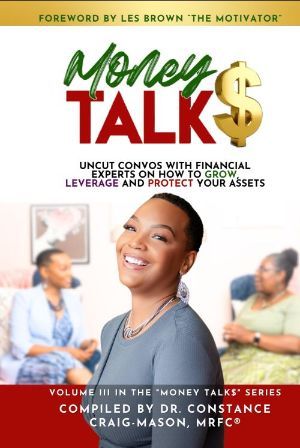
In celebration of her new book, carefully compiled with 24 of the most exceptional black voices in finance, Dr. Constance Craig-Mason is giving access to this groundbreaking new guide with special bonuses at www.monetalkschallenge.com
Best of all, in celebration of launch week, the eBook is only $4.99 (get it now, or you’ll miss out!)
P.S.
Grab your copy today for 50% off retail before the price doubles on Monday (October 23rd)!
www.moneytalkschallenge.com
Take charge of your financial future!
#baltimore#music#maryland#media#events#arts#amnglobal#monumentalmondays#photography#marketing#authors#black excellence#marylanders#blacktumblr#moneytalks#1ksavers
0 notes
Text
Somebody get Oscar Isaac's peepee filmed more, society needs more of his penis scenes
6 notes
·
View notes
Text
I know a singer with my name. She didn't go by Ali, though, and my mom is the only one who uses my government name. Hell yes, fucking snickerdoodle all day. I tried to make a snickerdoodle cheesecake with a snickerdoodle pie crust once, that shit did not set. I don't know what I fucked up, but I mighted just dumped milk and cinnamon in a bowl. So that's kinda on me, but that's woukd still be a fucking delicious idea.
That would be pretty fucking revolutionary. Telling uncut and unfiltered stories. I'd watch that. Making your own platform sounds like a bitch though.

Yes, that is why. I'm kind of brilliant. Oh I don't really know any movie characters called Ali, except the girl from Karate Kid. But yes you get 10 points! If you have the most points by the end of the week then I will bake you your own personal giant cookie. Any preference on flavor?
Neither, I want to create my own platform. Tell the real stories of people, sit down for exclusive interviews but not change anything or screw people over

#stacey evans ― 𝚌𝚑𝚊𝚛𝚊𝚌𝚝𝚎𝚛 𝚝𝚊𝚐#dash chat °( ft. stacey )#― interaction tag#°𝚒𝚗𝚝𝚎𝚛𝚊𝚌𝚝𝚒𝚘𝚗 𝚝𝚊𝚐 ↳ dash chat
110 notes
·
View notes
Text
What Do We Canonically Know About Christophe aka “The Mole”?
“What do you think this is, kid? [...] Huh? This is real life with consequences you take to the grave!”

For a character with only around 5 minutes of screen time in the 1999 film South Park: Bigger, Longer, and Uncut, Christophe (aka The Mole or Ze Mole) left quite the impact with the SP fandom. Much of this is due to the fact that, despite how little we see of him, he has such a complex and interesting personality. Is it really possible to obtain such depth of character in so little time? Today, I’d like to answer that question by exploring everything we canonically know about Christophe, as well as some personal speculation based on the canon.
To start, I’ll state that what I am taking to be canon is everything that happened in the movie, along with South Park Studios wiki page about him (as close to an official wiki as I can get).
The first time we hear about Christophe, he isn’t even present.
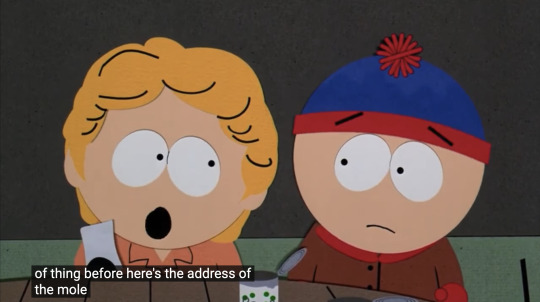
After Stan and the others volunteer to execute Gregory’s rescue mission for Terrance and Phillip (T&P), Gregory insists that they need help from someone who has “done this sort of thing before”. He hands them a card that has the address of someone who Gregory refers to as “The Mole” and claims he is “an expert in covert operations” and “a mercenary for hire”. Though Gregory calls him a mercenary, no money seems to actually exchange hands when the boys recruit him, so it’s possible that Gregory uses the term “mercenary” loosely. However, we know at the very least that Christophe is experienced when it comes to mercenary-esque work.
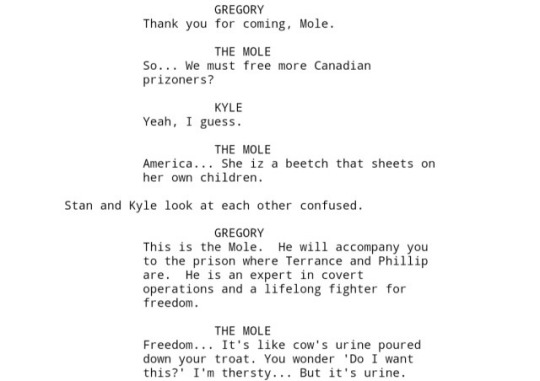
Additionally, we know that Gregory and Christophe know one another. According to Gregory’s official wiki, in one of the movie script drafts, Christophe asks Gregory if they are going to “free more Canadian prisoners”, implying that the two of them have been doing revolutionary work together already. While this concept doesn’t make it into the actual movie, I feel the fact that the official wiki page for Gregory references it means their implied partnership is something not to be overlooked.
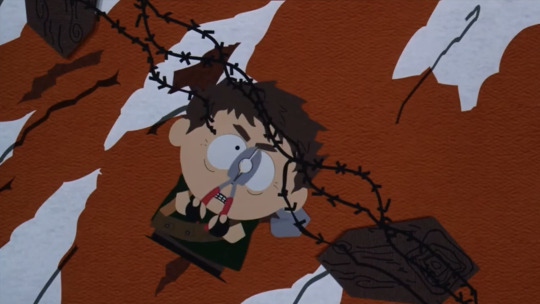
Similarly to Gregory, Christophe is very familiar with the layout of the army base where T&P are being held and the exact window of opportunity during the USO show when they can be freed. He also knew a spot to dig into the base where they won’t be immediately spotted, where to go to lay low once they’re inside, where the electrical box that shuts off the alarms are, and that there are alarms and that he will be attacked by guard dogs if they sound. Christophe even brought along wire cutters to deal with the barbed wire when sneaking into the base. This level of detailed knowledge and preparation is likely something he could only know from having scouted for the rescue mission ahead of time. Since Gregory conceptualized and presented the rescue mission during the La Resistance meeting, as well as initially volunteered to go, it’s possible that both he and Christophe planned it ahead of time.
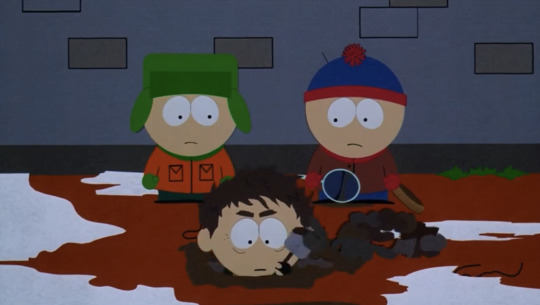
While on the subject of Christophe and his mercenary/revolutionary work, I would be remiss to not focus a bit on his incredible digging prowess. In addition to literally being named “The Mole” (an animal known for digging), Christophe utilizes tunneling twice during the mission. The first time is to break into the army encampment and the second time is to sneak onto the stage to rescue T&P. Supposedly, he’s able to do this in the span of less than 20 minutes, judging by the time on his watch at the start of the rescue mission (9:40) and the fact that Stan doesn’t seem late to the rendezvous later in the movie, which was set to happen at 10:00. This implies that Christophe possesses good, inhumanely fast digging skills, especially since he claims that the USO stage has bedrock and he is able to get through it.
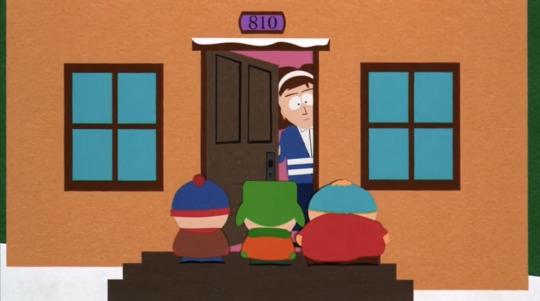
Going back to earlier, before we actually see Christophe, we learn more about him. First, it can be assumed that he lives in the town of South Park (house number 810), as Stan and the others can easily walk to his house. I know they walked because they’re meant to be grounded at the moment, so they can’t ask for a ride anywhere. Second, Christophe’s mother answers the door, which means we know that Christophe has (at least) a mother. Speaking of his mother, the two of them have an intriguing relationship that is never fully stated, but a lot can be inferred from what is implied.
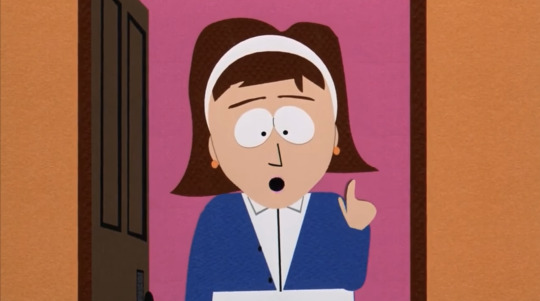
For starters, it’s not until she calls him to the door that we learn his name is “Christophe”, as before (and the rest of the movie) he was only ever referred to by his code name “The Mole/Ze Mole/Mole”. However, when the others use that name, Christophe’s mother knows who they’re talking about. This means she’s aware of what he does, but it’s possible she doesn’t quite know how real it is considering she tells the boys at the door that “Ze Mole[…] can’t come out and play”. Breaking into a US army camp to free political prisoners seems a bit intense for the word “play” to me. Also, the reason I use “Ze Mole” here is because she has a thick French accent. This begs the question of whether Christophe got his accent from growing up in France or simply developed an accent from socializing mostly with his mother. Sadly, I don’t have an answer.
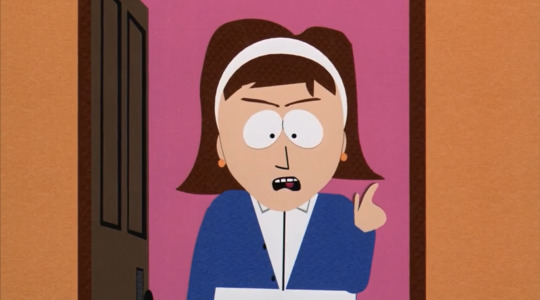
Christophe’s mothers says the reason Christophe can’t “play” is because he’s grounded for saying “very naughty things about God”. This specification that she is upset with him because he said naughty things about God rather than naughty things generally implies that she is 1) Christian and 2) cares a lot about respect towards God. This idea is further supported as she later gets upset (off screen) when she overhears Christophe starting to talk about God as an oppressive force later on. Her fixation on blasphemy (and Christophe’s constant usage of it) hints at the idea that she is perhaps raising Christophe in a very religious environment. Considering the fact that his name relates to being a devout Christian, this idea is very likely.
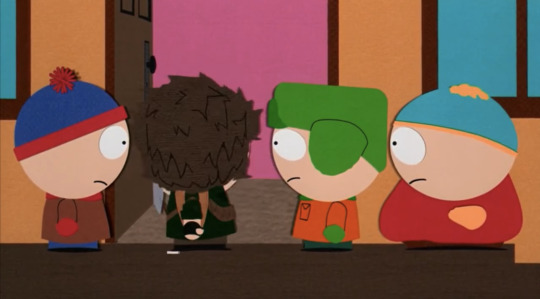
Despite how Christophe rebels by vocalizing his hate towards God, he appears obedient to his mother at least on a surface level. He comes to the door when she decides to let Stan and the others talk to him as soon as she calls him. He also immediately stops talking when she yells at him for badmouthing God again, snuffing out his cigarette and going back inside right away. (“What?! Christophe, get in here!” / “Coming, mother!”). He even initially turns down the opportunity to rescue T&P just because he’s grounded. Still, Christophe does actively disobey her by sneaking out later and continuing to blaspheme when not in her presence. It’s possible that he’s scared of her, which is why he is quick to heed her but refuses to actually change his ways.
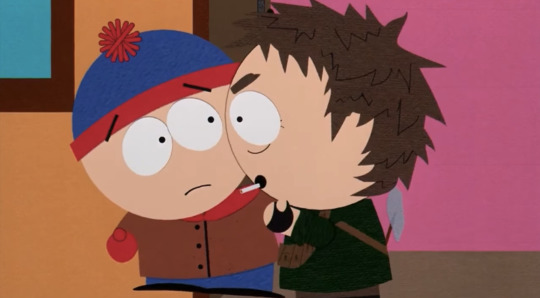
When we first see Christophe, he doesn’t appear very reactive to the strangers on his doorstep until Stan starts talking about their rescue plans. He immediately grabs Stan and shushes him, demanding “Who are you? Who sent you?” Even though he’s just a kid, Christophe seems extremely paranoid, which means his mercenary work might be legitimately dangerous. There’s a chance that he’s a wanted criminal. However, he lets go of Stan once Kyle mentions “that Gregory kid” sent them, implying that Christophe trusts Gregory and his judgement despite his paranoia.
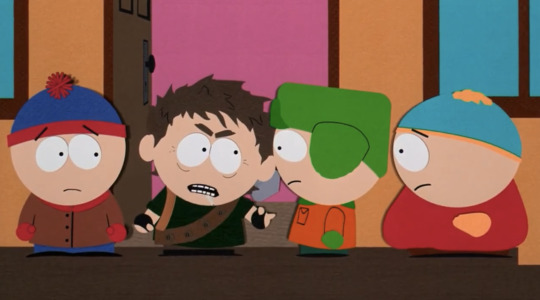
The reading of Christophe’s next line is a bit difficult to parse. Depending on the emphasis, he is either shocked that Stan, Kyle, and Cartman are the ones going on the rescue mission or he’s shocked that the plan in general is to rescue T&P during the USO show. If it’s the former, then he is rather quick to judge. Sure, Stan started explaining a covert plan with sensitive information at a normal speaking volume, but Christophe barely knows him or the others. How could he know if they’re incompetent or not? However, if it’s the latter, then it implies that a rescue mission of this intensity is too much, even for Christophe. This would shed some light on what level of mercenary work he’s taken on in the past.
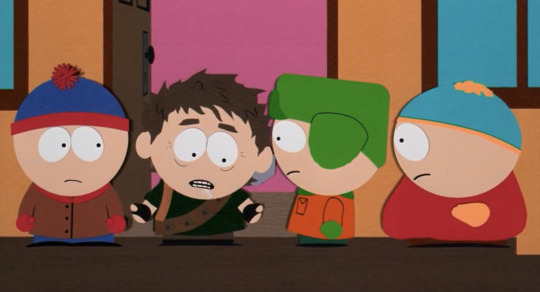
Either way, Christophe initially refuses only because he’s grounded. If he really is an expert mercenary (and the narrative paints him as such), then it’s curious that something as simple as that is what stops him from helping in revolutionary work. He even references grounding as a legitimate threat twice more in the film. This could connect back to the idea that Christophe fears his mother, to the point where he’s less scared about the difficulty of the mission and more worried about upsetting his mother. He only relents once he hears the other boys are meant to be grounded too, perhaps admiring their bravery for rebelling against their mothers and wanting to join in solidarity. When asked, Christophe reveals that the reason he was grounded was “because God hates [him]... He has made [his] life miserable so [Christophe] calls Him a cocksucking asshole”.
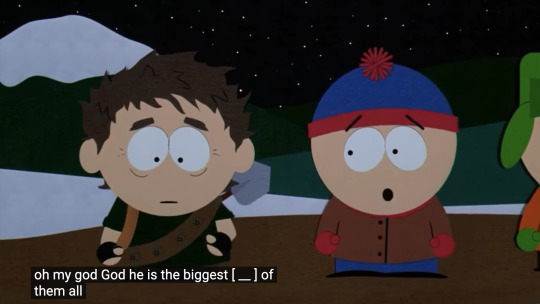
With that said, let’s talk about Christophe’s repeated displays of misotheism, or hatred of God. We already touched on his mother’s attitude towards God and her potential relationship with Christophe, which could contribute to why he feels the way he does. Beyond based speculation, though, Christophe voices his hate towards God a lot. Aside from his grounding, he goes out of his way to bad mouth God, calling Him “the biggest bitch of them all” and equating him to the US military, who he seems to hate (referring to them as “military bitches”), just because Kyle says “Oh my god” in response to something.
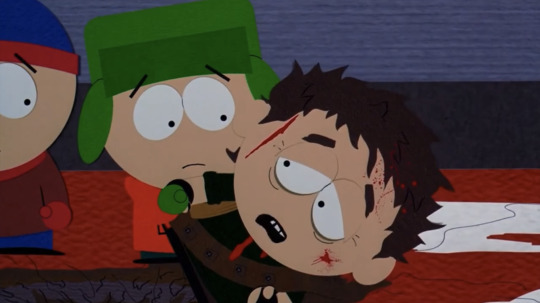
Then, of course, Christophe uses some of his dying breath to bemoan God and point out the hypocrisy of the idea that He is benevolent and merciful (“Where is your God when you need him, huh? Where is your beautiful, merciful faggot now?”). The fact that he casts doubt on the idea of God being infallible and suggests that He is, in fact, selective in who He helps, really continues to potentially paint Christophe’s mother in a bad light. Or, at least, whatever experience Christophe has potentially had with other religious (specifically Christian) people.

The oddest thing, in my opinion, is that Christophe still believes he is headed to Heaven when he dies. In fact, he has an almost resigned excitement about it, challenging God and threatening Him (“Here I come, you fucking rat!”) right before his death. Despite Christophe’s hatred of God, he also clearly still believes in Him and sees himself as worthy of Heaven. His feelings towards religion may seem very clear at a cursory glance, but there’s a lot of complicated emotions involved. This may connect back to his mother, or perhaps even to Gregory, who does seem to believe in God as a force of good.
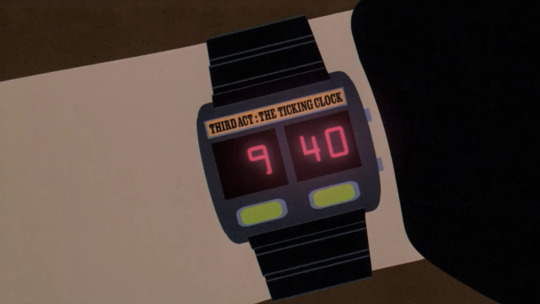
Christophe has personality traits outside of blasphemy though– the most prominent being his sense of humor! The watch he brings on the mission is labeled “Third Act: The Ticking Clock”. This is a reference to the fact that many movies will introduce a ticking clock (or just a deadline of any kind) in their third act in order to draw the audience back in. Outside of the obvious meta joke for the audience, I want to believe that Christophe finds humor in giving himself a “ticking clock” to make his missions more exciting. Considering how obsessive he is about the timing of everything (becoming upset when the boys don’t have watches to synchronize with him), I don’t think he’d get a watch with that label for no reason.
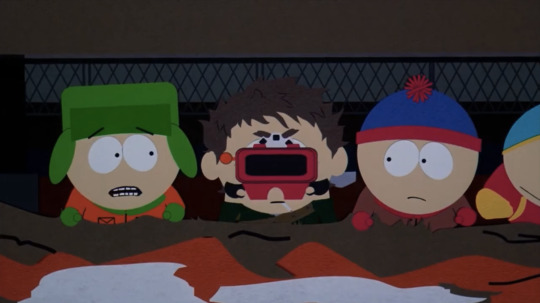
Another humorous thing he does is using a View-Master toy as binoculars in order to observe T&P. When Kyle asks if Christophe can see T&P, he claims that he can, yet the audience is shown that what he’s actually seeing is a bunch of safari animals. He seems to really like these types of animals, especially considering his distress signal is the sound of a dying giraffe. Going back, the fact that he uses this toy as if it’s a real pair of binoculars, lies about his observations while also being incredible accurate, and then gets the others to follow him by saying “Come on beetches” gives the impression that Christophe enjoys being funny, even if he is the only one getting the joke.
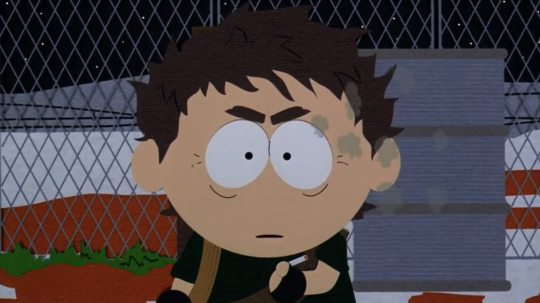
The other joke he makes in the movie also falls flat, though Christophe doesn’t seem to mind. While checking that the others brought everything he asked them to bring for the mission, he asks if they brought the “buttfor”. When Kyle responds with “What’s a buttfor?” Christophe replies “For pooping, silly” and takes a long drag of his cigarette. Despite the sensitive, timed nature of the mission, he takes the opportunity to crack a joke, a toilet humor based one at that. He has a very dry wit about him. Even if his expression remains deadpan as he tells it, the fact that he makes the joke throws doubt on the idea that his personality is one of only angst and brooding.
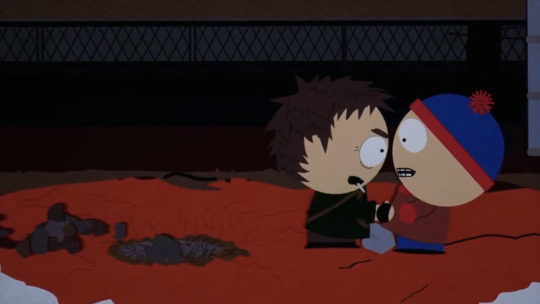
While he may be enough of a kid to use a toy like legit spy gear or crack toilet jokes, Christophe comes across as much more grounded and intense than the other boys. In addition to all his darker thoughts on God, he treats the mission with a grave seriousness. He chastises Stan for being focused on Wendy and finding the clitoris instead of what they’re doing (which also implies that Christophe knows what the clitoris is while the other boys don’t). He yells at Stan (and the others by proxy) again after learning they don’t have watches, reminding them all that “this is real life with consequences you take to ze grave”. He appears to take great offense to Cartman’s lackadaisical attitude about shutting off the alarms too, which makes sense considering how Cartman forgetting to do so results in Christophe’s death.
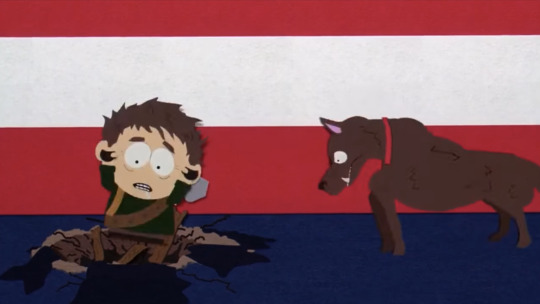
Death and injury are things Christophe seems quite familiar with. When telling Cartman he has to shut off the alarms or Christophe will be attacked by guard dogs, he is very insistent about his hatred of them (“You must shut off ze alarms! I fucking hate guard dogs!”). This gives the impression that he has experience dealing with guard dogs, specifically being attacked by them. Considering his implied history of mercenary work, this isn’t surprising. This is not the only known brush with death Christophe has had though. He reveals, rather unnecessarily, to Stan and Kyle that his mother attempted (and failed) to abort him (“Was my mother careful when she stabbed me in ze heart with a clothes hanger while I was still in ze womb?”). That particular interaction also shows that Christophe somewhat lacks emotional boundaries, or at least a basic understanding of social situations and dynamics.
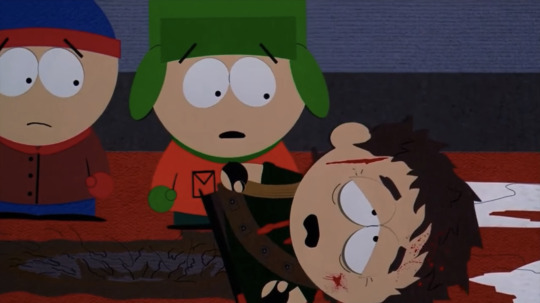
This familiarity with death could explain why Christophe takes his own death in stride. Aside from asking Kyle to hold him, which seems more out of necessity since he can no longer stand, Christophe tries to get the others to abandon him so they won’t also get hurt. He doesn’t even get angry when Cartman admits that it was his fault that the alarms went off, but it’s possible he just doesn’t have the energy to while dying. Christophe’s song, a short reprise to Gregory’s song La Resistance, is about how “although [he] dies, [their] freedom will be won”. Christophe, like Gregory, seemingly idolizes the concept of being a martyr and dying for a cause, specifically fighting for freedom. The notion comforts him, and he’s able to face his death nobly.
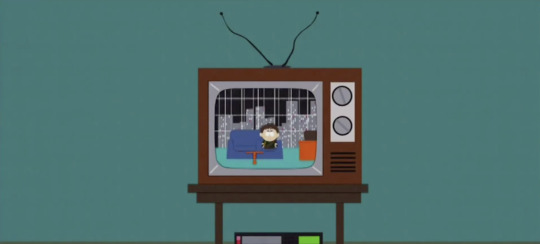
It should be said, however, that Christophe is not actually dead! At the end of the movie, Kenny wishes for everything to go back to how it was before, reviving everyone who died. Even if we don’t see Christophe again in the movie, leaving his fate uncertain, he does appear once in the actual show of South Park. In the episode Two Guys Naked in a Hot Tub (s3e08), Stan flips through many TV channels. For the briefest moment, Christophe is on the TV, seemingly a guest on a talk show of some kind. It’s unclear why he might be on one, but given the fact that the episode aired after the movie was released, this proves that Christophe is alive.
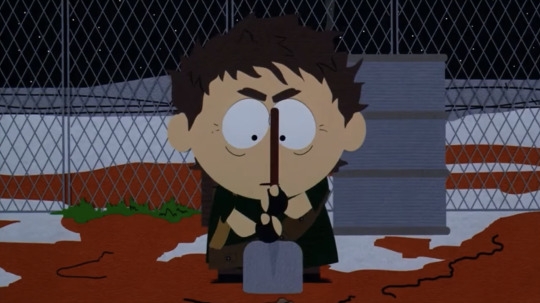
Now that we know all there is to canonically about Christophe, what can we say about him? First, he and Gregory not only know one another, it’s implied that they’ve worked together on past mercenary/revolutionary work. Christophe himself is an expert and experienced mercenary in all aspects (scouting, planning, and doing). He defaults to tunneling as his main method of operation, likely because he digs incredibly fast and efficiently. This tunneling is also probably why everyone calls him “The Mole”. Christophe and his mother have an interesting and seemingly strained relationship, stemming perhaps from his fear of her and/or her anger towards his disdain for God. This disdain for God permeates so much of Christophe’s character and he takes any opportunity to voice it.
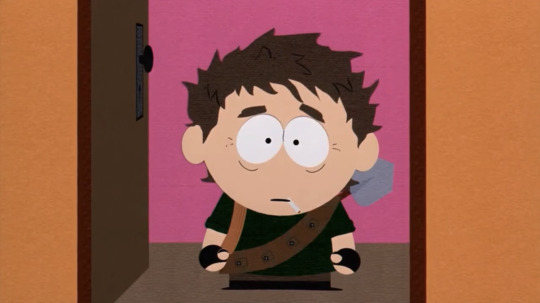
In addition, he is hinted at having various near death experiences in the past, which results in him having a stern personality, becoming frustrated when others aren’t taking things as seriously as him. When he does die, however, he doesn’t fight it and takes comfort in being a martyr for a good cause. Despite this emotional baggage, he has a prevalent and dry sense of humor, as well as an apparent interest in animals. Lastly, Christophe is not actually dead and was actually resurrected via Kenny’s wish at the end of the movie.
#south park#christophe delorne#the mole#ze mole#south park meta#sp christophe#sp ze mole#sp the mole#MEN I'M INSANE ENOUGH ABOUT TO WRITE ~3k WORTH OF ANALYSIS ON FOR 5 MIN OF SCREEN TIME#talk to me about him whenever wherever please please he is my boy and i love him infinitely. need more christophe fans out there.#and if youre wondering where i got the last name delorne from. well. that's another pet project of mine you may ask about
140 notes
·
View notes
Link
- full speech :
I’m here to give the award for Best Original Screenplay to the Safdie brothers and Ronnie Bronstein. It was challenging for me to write these remarks, not only because of the incredible and intimidating talent in this room tonight, but because what the Safdies do for me as filmmakers is so revolutionary, it’s hard to limit the remarks to just the screenplay. Also, because I’m a dumb 24-year-old actor, I’ve never written anything. I stand on a mark, I say what people tell me to say.
I don’t know what insight I have about screenwriting, but here’s my go. Trying to describe their approach to writing, it’s to know exactly what they want in a pre-production process going into filming, and then on the day, finding those jewels and gems in the rough of collaboration and the day to day adrenaline of filmmaking. A frenetic stylistic approach to filmmaking that can be interpreted as improvisational and unplanned, but make no mistake, with the Safdies and with Ronnie, it’s not. This task is made easier when the actors you’re working with are of the caliber of Adam Sandler, Lakeith Stanfield, and Keith Richard Williams. That’s not Keith Richards, that’s Keith Richard Williams. If you’ve never heard of him, that’s because the Safdies literally found him on the street in New York and cast him, like half of the characters in their movies, which sucks for actors like myself with résumés.
Their 2017 film Good Time was a straight shot about a bank robbery gone wrong, and a deranged young man’s relentless and untiring attempt to free his brother from custody. The movie follows Robert Pattinson’s descent into moral-less madness. If Good Time was a shot of tequila, then Uncut Gems plays like cocaine and mushrooms with a little sprinkle of Alka-Seltzer on top. Adam Sandler gives a truly awe-inspiring performance. It’s like Adam Sandler watched Punch-Drunk Love and was like ‘I’m going to do exactly that again, except the exact opposite.’ And Josh and Benny and Ronnie created a tornado of stress, swag, fucked-up intrigue and unapologetic, raw, truthful filmmaking. These are movies people my age can actually not get bored as fuck watching.
Let me end on this anecdote, and I apologize for personalizing it. About a month ago I texted the guy I look up the most to in the business, inviting him to a premiere. He said he couldn’t come, but he invited me to a dinner with Martin Scorsese that would be happening 30 minutes later that night. I was literally on the toilet when I got that text. So I did Google Maps check, I was uptown within 30 minutes. I hope not to embarrass you if you’re here tonight, but at the dinner I was shocked by Mr. Scorsese’s self-depreciation, his razor sharp wit, and his good humor. I was the young guy at the table but I was having trouble keeping up with the pace of conversation and the sophistication of movies being referenced.
I made a joke about how if The Irishman was successful, I’d never work again, because from now on I’d be auditioning against James Dean, Marlon Brando, and Charlie Chaplin. He very calmly and humbly said it was now time for a new generation of filmmakers to take over. He pointed out, for example, the Safdie brothers. I didn’t know in that moment, but he actually executive produced Uncut Gems. The comparisons are obvious: They’re both truly New York filmmakers in their blood, they both explore the psyche of devilish and morally ambiguous protagonists. In many ways, Adam Sandler Howard Ratner parallels Ray Liotta’s strung out Henry Hill in Goodfellas. This is high praise. I know it. Who am I to dole it out? And yet this is no longer the golden age of cinema. It’s no one’s fault — except maybe Ronald Reagan, no just kidding.
It seems every expression of art has its great moment in time. And yet this is why we need the Safdie brothers right now. This is why we need Barry Jenkins, and Greta Gerwig, and Mati Diop, and Ari Aster, Lulu Wang — not to reignite the golden age party that is definitively over. The world is on fire as we speak. [We need them] to make the art that is truthful to the times and a true mirror of our times. And, in the Safdies’ case, really unapologetic too. Maybe it won’t be as big of a party, but it will be unique as fuck.
224 notes
·
View notes
Text
THE BEST FREE CONSOLE AND PC GAMES TO CLAIM IN MAY 2021
We all love video games, but sometimes they are too expensive to buy. But there have been times game studios and other services offer a free of handful titles over a period of a month. So, don’t miss out. Here are things you can download in May and enjoy.

We have already talked about this that we all love games, but if it is free, we will take it any day. Some places offer a good collection of that but for a limited time offer. Epic games add a few games for free in weeks. Amazon’s Prime Gaming provides you with a subscription and has a new title each month.
Now the hard part if you don’t pay attention, you will lose on these games.
For people to not lose on these games and know where to claim the games. We are here to help you with the best games and track them and when they are available for free in which month. Some titles you can grab for free without anything, and some require a subscription. Here’s everything you can grab this month.
Pine
This game is set in a world where you humans have to go toe to toe with evolved anthropomorphic animals; this is an indie-style game where you can travel to different lands and solve different puzzles and find and fight enemies and trade items. The world in the game is constantly changing. The NPCs and the villages are constantly changing and reacting to players and their actions.
Sludge Life (Until May 28)
This is the third-person 3D platform with the graphics of CRT graphics. This is a short and simple game allowing you to experience the game and explore the surreal world. Now meet a cast of crass characters and can visit the tag area with graffiti. Devolver Digital has made the game free for everyone for the next year.
Rocket league (Free Now)
It is a competitive sports game that combines high-speed racing gaming. This is a competitive game where you get to play soccer with race cars. During the last fall, the game moved exclusively to the Epic game stores, and you know it. It became free to play for anyone who wants to play this game. This game also won the Editors choice awards because it was so fun to play and a different concept. This is one of the best PC games out there, and you can get it for free.
Best free GOG games:
GOG doesn’t always provide you with free regular giveaways like some of the other websites too. There are few collections of free games which are classic and the best computer games out there. The games like Shadow Warrior and Postal: Classic and uncut. These are the games you have to pay for on steam, but here they are free. There are other classics like Ultima 4 and Akalabeth: World of Doom 1979 that are not available anywhere else. Here is a list of some games that you might find here but not anywhere else.
Akalabeth: World of Doom (1979)
Beneath a Steel Sky (1994)
Ascendant (2014)
Bio Menace (1993)
Delores: A Thimbleweed Park Mini-Adventure (2020)
Doomdark’s Revenge (1984)
Cayne (2017)
Eschalon: Book I (2006)
Flight of the Amazon Queen (1995)
The Lords of Midnight (2013)
Jill of the Jungle: The Complete Trilogy (1991)
The lure of the Temptress (1992)
Postal: Classic and Uncut (2003)
Tonight, we Riot
This is a game about the revolutionaries. You have to take control of them, and then you help them riot. This is a game about where you take control and then make an effort to overthrow their oppressors. You can claim the game on the GOG for free.
Children of the Morta (While the supplies last)
This giveaway is a little different from others because you have to make a purchase to get a free game out of it. Here GOG and Visa have combined forces where they are giving away 53000 codes for the action of RPG Children of Morta. You can get the game by signing on the giveaway page and making a payment of 25$ payment using a Visa Card.
The Witcher: Enhanced Edition
GOG allows you to score a copy of the first Witcher game for free and if you have a GOG Galaxy desktop client. In the recent view and click the giveaway button, and you can see that at the top of the screen. As long as you agree to the terms and conditions, you can get the best game in the market for free without any fuss.
Conclusion:
So here we are writing this for all the lovers of the game. The games that you can get for free without spending any money. Hope you find this useful. Thank you for the read.
Source: THE BEST FREE CONSOLE AND PC GAMES TO CLAIM IN MAY 2021
1 note
·
View note
Link

LaKeith Stanfield Settles Into His Toughest Role Yet: Himself
As he heads towards his thirties, the electrifying actor is laying himself bare — and finding a new sense of balance
by Tirhakah Love Feb 12
For nearly a decade, LaKeith Stanfield has used his screen time reveling in the bizarreness of America’s racial consciousness. Whether Atlanta’s quippy street mystic Darius, or the code-switching sardonics of Cassius in Sorry to Bother You, his characters have always seemed to be in on the joke — and in his latest, Judas and the Black Messiah, Stanfield is closer to the secret than ever before.
Shaka King’s film, which chronicles the final days of Black Panther Party Chairman Fred Hampton (Daniel Kaluuya) through the sullen eyes of FBI informant William O’Neal (Stanfield), finds the actor in his darkest, most nuanced rendition of the Black saboteur to date. “It was one of the hardest things I’ve ever had to do,” the 29-year-old said over a Zoom call last week, “I just really wanted to make sure I was getting it right. But then also not getting it too right, if that makes sense.”
Stanfield has built a name on playing conflicted characters, but a figure with as much baggage as O’Neal — who was forced into his own role while still a teenager — demanded what he calls a “necessary nuance,” one that became, at times, overwhelming. The film set became not just a vision of radical Black politics, but a space for Stanfield to process his own upbringing in order to be a more “realized, holistic” person. LEVEL spoke with the actor about how playing O’Neal helped illuminate his path toward a healthier decade that included both therapy and meditation, heading into his thirties.
LEVEL: Judas and the Black Messiah was supposed to drop in August, but 2020 had other plans. How does it feel to know it’s coming out?
LaKeith Stanfield: I’m excited. I want people to learn about Chairman Fred Hampton’s story. It’s something that’s not spoken about enough. Everything has been such a question mark with this pandemic — not knowing how it was going to come out, or whether it would come out, period. So here we are with Black History Month, this story of Chairman Fred Hampton, and everybody gets to experience this in the most honest way we could put it in. I’m really happy. I’m going to host a screening at my house and just invite everybody… who’s been tested. [Laughs]
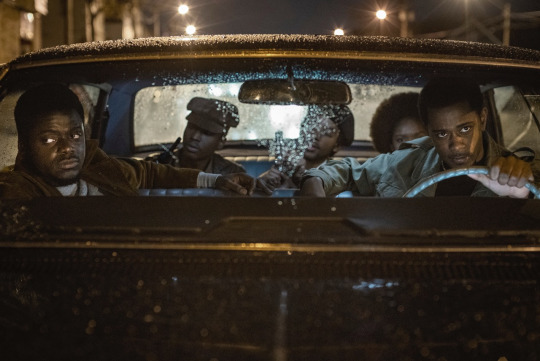
By my count, this is the second role that Daniel swiped from under your nose. Didn’t he get you for Get Out, too?
That’s right. You know what, for Get Out I auditioned for like every role. I came in and I read with Jordan Peele. And then I read for another — I think it was Rel’s role — and ended up eventually reading for my role. Damn, I forgot all about that.
How can we keep being friends with a dude who just steals roles from you, bro?
Nah, it’s all good. [Laughs] Ultimately, those decisions are made by people who have a better understanding about casting and their relation to the story than I do. If they’d asked me to play a hat in this movie, I would’ve done it.
It doesn’t seem like a Hollywood thing to do at all.
Hollywood is not always behind things like this. It took years to get it to the point where we could actually make it. These are stories people are yearning for. We have to always prove that time and time again, unfortunately, but it is what it is. We show and prove these kinds of stories are human stories. They’re specific to the Black experience, but it’s global. We hope that we can get these studios to understand that more and more.
How did you relate to [William O’Neal’s] isolation and paranoia he lived with? How did you tap into that?
I didn’t see him as someone I could connect to, so we started to design the character from the inside out. The thing is, we don’t have any information about O’Neal outside of his Eyes on the Prize interview, a couple of court transcripts, and other eyewitness accounts. We could create him from scratch and give him different dimensions. I wanted to introduce how he might be a thrill-seeker. He might get fun out of creating imbalance. He steals cars — he wasn’t very afraid to put himself in a line of fire — but he was also a person who eventually felt guilty about what he did. In the full-length version of his Eyes on the Prize interview, he says at one point, “I felt bad about the things I did, but I had to continue to play the role.” He contradicts that later by saying, “I’ll let history speak for me.” Clearly this guy has an internal struggle that we missed.
Wearing all these different masks.
In the scene where I had to poison him, a lot of it didn’t end up making it to the final cut, but we shot [me mixing it in] Kool-Aid, and I had to go through all those motions. With somebody like Daniel, who I just respect as a human and an artist, as Fred Hampton, it felt like I was actually poisoning Chairman Fred Hampton. One thing [co-star] Dominique Fishback mentioned to me is that your body doesn’t always differentiate the experience from your imagination. So sometimes your body thinks that’s real, everything you’re putting it through. It’s no wonder I’ve been feeling so stressed out and having panic attacks. I realized going forward before I step into something like that again, maybe have a therapist. [Laughs]
“There’s a dynamic between celebrity and the common man that Covid-19 has really lifted the veil on. We all gotta wear our masks or we suffer the same fate. You’re not special.”
For Black people playing an op it’s different. There’s real pressure. Especially for a character who’s never been portrayed.
That’s how I felt when I first figured out I found out who he was. But you don’t go into something like this not knowing that’s going to be the case. I hope I was able to portray him in a way that made people see themselves in the character. What decisions would you have made? Were you trying to go to jail for five to 10 years? Would you try to stay out? What does that mean? Those are the more important questions. Let’s say there’s a million people in the world: two of them are Fred Hamptons; the rest are William O’Neal. I want to challenge people to think about the ways they might be O’Neal-esque. And maybe through seeing this, you might distance yourself from some of those things.
If the pandemic has revealed anything, it’s the disconnect between the celebrity class and everyone else. People like Hampton and [Bobby] Seale are trying to do cultural work. We’re seeing that there’s disconnects here. How does a film like this impact your view of celebrity?
These roles are metaphors for so many things. Chairman Fred Hampton as a metaphor for socialism, selflessness, and O’Neal could be argued to be a metaphor for capitalism and selfishness, or perceived celebrity ego. There’s a dynamic between celebrity and the common man that exists, which Covid-19 has really lifted the veil on to a significant degree because we all sit in here on Zoom, right? [Laughs] We all gotta wear our masks or we suffer the same fate. You’re not special. This made everybody have to sit down and confront that idea.
[Laughs] Right.
One could argue that the fact that Fred Hampton died at a young age is justification as to why you shouldn’t try and put things outside yourself for the greater good, because it ends up being helpless and hopeless. I don’t agree with that. I think that Chairman Fred Hampton’s legacy lives on, like he said, “you can kill a revolutionary, but you can’t kill a revolution.” I remember being in that scene where Daniel was giving a speech, and I’m thinking, the things that Chairman Fred did all those years ago, today we are here experiencing this moment collectively because of him. While I’m doing this, I’m looking into the audience, seeing Afros, seeing Black people, seeing the beauty and the confidence and love, I don’t really even see that these days. So he zapped me back into a time where this is what people were on. We gotta find that in ourselves again and unlock it
You have a great way of playing chaos agents. Whether it’s a muted performance in Atlanta or muted in a different way in Uncut Gems, where your character was always on the fucking edge. Why do those roles as subversive figures speak to you?
I haven’t really thought about it but I know one thing’s for sure: I tend to lean toward characters who have internal dialogue or struggle. I like trying to find some groundedness and truth in the in-between of two extremes. These characters appeal to me on a subconscious level because that’s how I am. I like taking things to crazy extremes and then trying to find some kind of balance in that. I’m also attracted to characters being able to show the mirror to you and have you see something that activates something in you. Those characters that have you see yourself through absurdity.
You mentioned earlier how young these dudes were. Fred Hampton was 21 years old when he was killed. If he made 24, 25, I’m wondering how much more he could have gotten done. Being Black, we make it to 25, it’s a thing. You’re now about to make it to 30. How’s it hitting you? Do you think about age at all like that?
Not really. Not really, but to some extent, this is a landmark moment for me. I feel like I’m just starting to really get my shit together, like personally. And be the better version of myself for myself. I just started therapy just this year.
Yo, congrats.
Thanks man. Going into my thirties, I plan to continue to do it. It’s been helpful for me to unpack a lot of stuff. I’ve been through a lot of stuff, there’s a lot of things I just didn’t confront. Those things mount; you act out in different ways and they can become harmful to you. So I just said this year, I’m going to make the choice to try and be better. Like I was always throwing off therapy. I never wanted to try it. I was like, whatever. It was just something that’s bad in my family. Growing up, everyone’s like, “therapy, what the fuck are talking about?”
So I wanna continue working on that — working on myself and finding a better sense of balance, and by virtue of doing that, unlock more potential in my heart. And I’ll be able to express in a more realized, whole holistic way. Those are my ambitions moving forward.
There’s always a moment where you just know that you need it. That, there are strategies you just don’t have that you need to build to be a person. Was there a moment for you where it’s like, fuck I really gotta go to therapy. I really gotta get some help?
I wake up every day and I have the same thought: Fuck, I gotta go to therapy.
[Laughter]
I was kind of raised like a wolf. I didn’t have parents or people who were guiding me or told me anything. So I had to figure out everything on my own — try on masks and faces and hats and wigs — and try to figure out what my place is in the world. For a long time, I didn’t realize I was stunted because of that. Not having that at home, and at an early age being traumatized by things I was seeing. Just now, I’m starting to really find the tools to help me pull that young self out of that abyss. It took me a while to even realize there was a problem because I was like, “Oh, you guys are crazy. I’m not crazy.”
Were you shopping for therapists during the pandemic?
It’s all on Zoom now. I’ve found this really cool therapist. It’s great and perfect for me right now. Hopefully it continues to be the case. It’s helped me a lot. After doing press yesterday, I had another session and it was amazing. It helps you unlock things about yourself. It’s not even necessarily about the person that you’re doing therapy with, but like you said, perspectives and strategies and tools that you didn’t have access to before.
Especially in the work you do, it’s important to extricate yourself — that period of like, okay, I gotta get out of this. How have you come back to yourself in this period of time?
It’s been meditation. The one good thing about this pandemic is being able to sit at home by yourself and deal with yourself and just your inner voice. And even though that’s annoying as hell, beautiful clarity comes out of it. People would be surprised how many answers they can give themselves just by listening to themselves and not distracting yourself with so many things like social media or movies and stuff. Now, it isn’t easy, especially once you become hooked into a pattern, but it’s really worth it.
That’s been beautiful for me just to take those moments. It’s important and it’s taught me a lot about myself. And that’s kinda what pushes you. Now that you understand and recognize some of the issues that you want to make better about yourself, you can plan on ways to do that. Whether it means therapy or yoga, which I also started doing.
There’s a scene in the film that feels like the Last Supper, and it’s just gut-wrenching. That sense of dread is so hard to tap into, but it also feels of a piece with what so many of us have been going through — knowing that people are losing their lives, either from our government or from a virus, and living with that same dread.
It’s a real thing. I went to the hospital recently on some health stuff. When I was in there, there were a bunch of Covid-19 patients being moved about. Being in a hospital is pretty scary right now. People screaming and literally dying around you. There’s an overall energy. Like this feeling of loss permeating in the world today.
Before we started this movie, my best friend who I grew up with got killed by his brother. So I was carrying that with me the whole time. One thing that made those moments real for me is that I know what it feels like to lose somebody abruptly, violently. When we filmed me having to poison Fred Hampton, it was a really tough day — I was thinking about my own brother, just in a whole different place all day. On set crying. That sense of loss, knowing the violence of all of that, really informed everything for me. There was no distinction between reality and what I was experiencing in the moment. Most of the takes in that scene, I was actually bawling. I had to tone it back.
The worlds are just overlapping with one another. That’s fucking wild.
I hope having gone through all that, somebody watching it can be moved or touched. Maybe it helps put emphasis on Fred Hampton and why it’s so valuable to protect people like him.
As someone who lost someone close recently, some days it feels like your worlds are collapsing on one another. I just lost my dad this past summer. It’s weird to even talk about, but the fact that you have to just carry on, with your friend’s death sitting in the back of your head is…wild.
With movies, you never know if we’re doing the right take, or even if it’s ever going to be seen by anyone. Especially with something like this, you never really know. I’m so grateful for everybody putting their best foot forward. I want everybody to see it. I really want Black people to see it, especially Black kids in Chicago. I want them to see someone who really put things outside of themselves and put something first and gave in love. I just hope that somebody sees it and it touches them. It makes them think about something a little differently. That’d be dope.
This interview has been edited and condensed for clarity.
#black history#black men#black panther party#black panthers#black people#bobby seale#chicago#daniel kaluuya#fbi#film#fred hampton#interview#lakeith stanfield#shaka king#usa
5 notes
·
View notes
Text
Heart of Fire Dragon, Soul of Flame Phoenix, & Sea Fairy Ocean Water Excerpt
The cut and censored version is the pinned tweet on my twitter. The uncut and uncensored version is on a google doc on my google drive.
Chapter 5: Verse 3:
A Letter Written in Blood and Signed With Tears:
Dear China, France, Japan, & America
Vietnam once demanded an apology for what you fucking did to her
For how you defiled and desecrated her land and her seas
How you displaced her Vietnamese or Kinh Indigenous children into displaced disconnected diaspora
Under your colonialism, imperialism, neocolonialism, & occupation
But you refused to listen to her tears of fire, water, & flame
In fact as colonial imperialist powers you refused to atone for your crimes
So she wrote you a letter
A letter written in the blood of her children that you murdered
A letter signed in the tears of her children that you displaced
The French and Japanese they chopped off my people’s tongues and fingers as punishment for our resistance and our defiance
My grandmother personally saw this herself first hand giving her depression, anxiety, & PTSD
This gave her children and her grandchildren all inter generational traumas
This gave her children and grandchildren mental illnesses of depression, anxiety, panic attacks, and PTSD
The French and Japanese removed my people’s tongues so we could not sing revolutionary hymns
The French and Japanese severed my people’s fingers so they could not ball up a fist in resilience and defiance
The French and Japanese severed my people’s fingers so they could not point in their oppressor’s faces
The French and Japanese severed my people’s fingers so they could not celebrate peace ever again
Every Southeast Asian Vietnamese Indigenous Kinh child of color knows this story in their dragon heart
Every Southeast Asian Vietnamese Indigenous Kinh child of color knows this song in their phoenix soul
Despite never hearing it and they cry
They sob dragon tears of fire, they bawl fairy tears of water, & they weep phoenix tears of flame
They bawl because the Indigenous Kinh ancestors and the elders themselves would howl for them
The Indigenous Kinh ancestors and the elders would weep because their homeland has never known a land that was free
The ancestors they have never known a homeland that wasn’t under colonialism, imperialism, neocolonialism, & or occupation
We were under the boots of the Chinese, the French, the Japanese, & the Americans
We were under their rule, colonialism, imperialism, neocolonialism, & occupation
Our homeland was always Indigenous stolen land occupied under oppressors
So we know no superpowers that are more powerful than solidarity, community, & intersectionality
So we know there is no force in this world that is stronger than resilience, resistance, & defiance
Our existence is resistance and our existence is political whether we like it or not
Our ancestors were aware of solidarity, community, & intersectionality even if they could not articulate it
We inherited our ancestor’s resilience, defiance, & resistance for it is our legacy, inheritance, heritage, & birthright
France your Catholic missionaries came to our lands and our seas
Like China they told us that our Vietnamese Indigenous folk spirituality was wrong!
They told us that our belief in no god and our veneration of the spirits of our ancestors was immoral!
China told us that we should follow the teachings of a Hindu teacher and prophet as Buddhists!
France told us that we should follow their monotheistic Christian god and so forcibly converted us against our will!
You both banned our Vietnamese Indigenous folk spirituality faith and imposed upon us your religion and spiritualities!
Your French government came and suppressed our culture!
Making every aspect of our racial identity and cultural identity as Vietnamese or Kinh Indigenous people illegal!
You enslaved my Vietnamese Indigneous Kinh people!
You exploited our labor and took our resources!
Like China you forced us to use your language against our will!
We as Vietnamese or Kinh people had our own Indigenous writing system that we used since time immemorial!
Then China forced us to use their Chinese characters during a thousand years of Chinese colonialism and imperialism!
Then France forced us to use their Latin alphabet during a hundred years of French colonialism and imperialism!
Japan your soldiers when they came to Vietnam they massacred men, women, children, and the elderly!
By executing them with rifles in the streets like fucking dogs!
Your soldiers tortured and beat my Kinh people!
They severed their tongues and fingers!
Then wore them around their necks like fucking war trophies!
You assaulted and raped our Indigenous Kinh girls and women!
You fucking starved my people of rice!
When they had the gall to steal it because they were so hungry you took one of their arms!
You disfigured them by chopping off their arm with your odachi swords as punishment!
My Vietnamese grandmother and Chinese grandfather watched as people chewed on sandals to keep them from starvation…
Maybe that is why she hates it when we throw away food
She yells at us even when we throw away even a speck of rice
Cuz she knows what it is like to look at rice, tofu, & noodles like salvation…
America you bombed my jungles of my home with napalm!
You gassed my people with agent orange!
You littered the land of my home with your fucking undetonated landmines!
How many times has Vietnam been forced to watch as her Indigenous Kinh children by subjugated by oppressors
How many times has Vietnam been forced to watch as her children be under the boots of the Chinese, French, Japanese, and Americans
How many times has Vietnam been forced to watch her lands and seas
Be under colonialism, imperialism, neocolonialism, and occupation
How many times did she scream when she saw her children be murdered
How many times did she cry when she saw her children be displaced
She cried dragon blood tears from her eyes
She no longer screams a flame phoenix scream because she screamed until her voice was hoarse
She no longer cries sea fairy tears because her eyes are bloodshot red
So we her sea fae children scream a sea fairy scream for her
So we her flame phoenix cry flame phoenix tears for her
So we her fire dragon children snarl and roar out in rage and fury
Dear China, France, Japan, & America
Vietnam once demanded an apology for what you did to her
For how you defiled and desecrated her land and her seas
How you displaced her Vietnamese or Kinh Indigenous children into displaced disconnected diaspora
How you occupied Kinh Indigenous stolen land for years, decades, centuries, & millenia
Under your colonialism, imperialism, neocolonialism, & occupation
She demands an apology for your war crimes, your barbaric violence, & for your inhumane acts of cruelty
But you refused to listen to her water, fire, & flame tears
In fact as colonial imperialist powers you refused to atone
You as vile heartless monsters didn’t look away in shame but laughed in wicked pride
So she wrote you a letter
A letter written in the blood of her children that you murdered
A letter signed in the tears of her children that you displaced
She cried as she held her dead sons and daughters
The people of the land and the seas of the fire dragon, flame phoenix, & sea fairy demand retribution and you will answer it!
Sincerely a child of the land and the seas of the fire dragon, water fae, & flame phoenix!
Cuz I want reparations you fucking son of a bitch!
You dare ask me why I am full of hatred, disdain, & loathing?!
You dare ask me why I am full of wrath, anger, fury, & rage?!
When you desecrated and defiled my homeland!
With your colonialism, imperialism, neocolonialism, & occupation
When you displaced my Vietnamese or Kinh Indigenous people!
Making them displaced disconnected diaspora in foreign lands that were never supposed to be their home!
When you warped and perverted my Vietnamese Indigenous Kinh language with your Chinese and French!
When you commited cultural genocide against my Vietnamese Kinh Indigenous people!
When you forcibly converted us from our Vietnamese Indigenous folk spirituality to Buddhism and Catholicism!
When you banned my culture, my language, my traditions, & spirituality!
When you oppressed my Vietnamese people under your oppression for years, decades, & millennia!
When you tortured and beat my people!
When you massacred and butchered my people in the streets like dogs!
When we asked for refuge and sanctuary of political asylum as war refugees!
And you turned away hundreds of thousands of us who were on boats seeking new land!
Filled with men, women, & children and let our bodies drown in the cold dark ocean!
To be welcomed into the afterlife by the Polynesian Ocean mother and the Polynesian Goddess of the Night!
When you let Vietnamese Indigenous Kinh girls and women be raped and assaulted by sea pirates!
You are fucking lucky that I want justice not retribution or vengeance!
For if I wanted to I as a child born of fire, flame, & water
As a child of a fire dragon, sea fairy, & flame phoenix
As a child of the earth, ocean, & sky
Could burn and drown this entire fucking world a thousand times over for what it did to my people!
#native#native writer#native artist#ndn#ndn tag#ndn writer#ndn artist#indigenous#indigenous writer#indigenous artist
2 notes
·
View notes